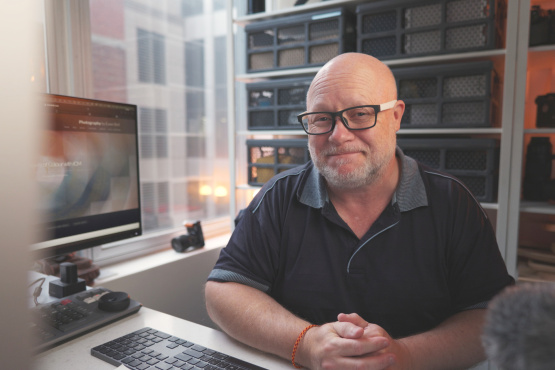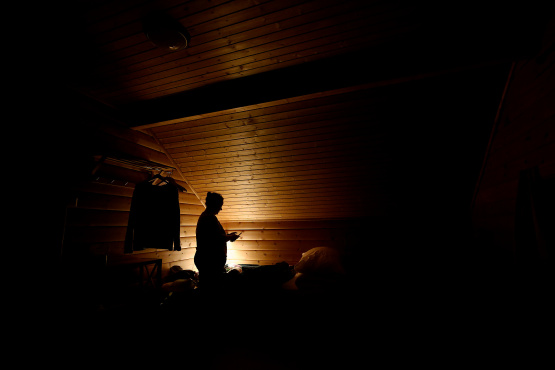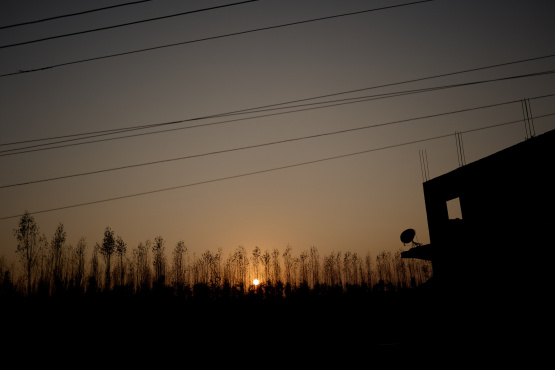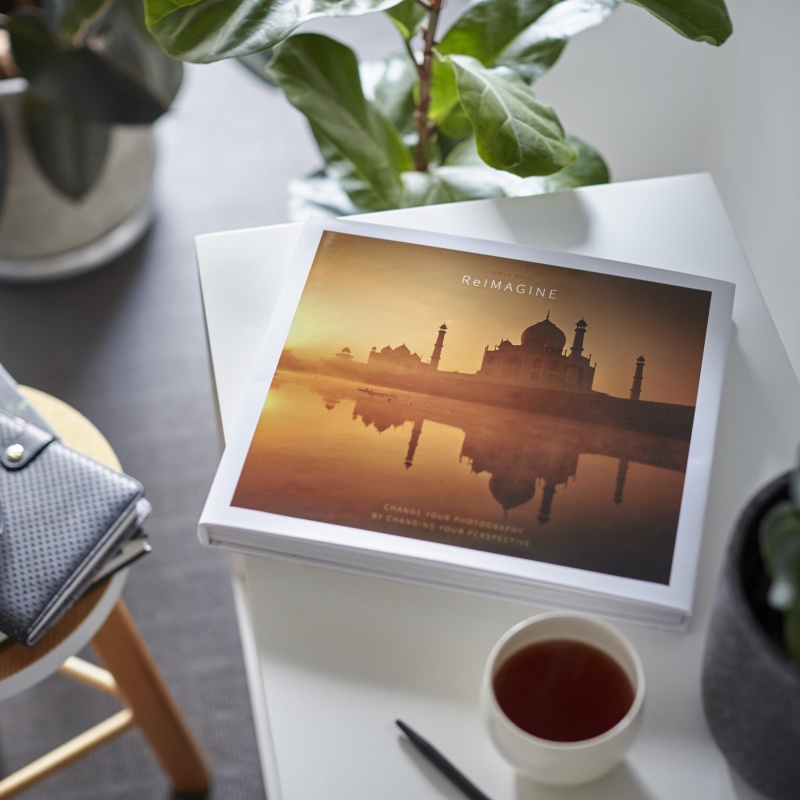Let There Be Light
Being a talented photographer is not enough. It’s essential, but it’s only half of the equation. I have met so many incredibly talented photographers who end up failed businessmen and barely able to keep a roof over their heads. When you’re 20 something it’s called ‘character building’. When you’re 60 something it’s bordering on a tragedy. Too often I’ve seen immense talent thrown to the wind for the lack of effort to build a career. A little bit of hard work and very dull planning in your early decades can make for a much smoother ride through your later ones.
For a photographer these acts of laying the foundation can seem very dull indeed. Build a proper website and stop pretending that SmugMug or PhotoShelter is good enough. Work out a business plan that focuses on a solid core of income that meets your minimum needs. Make sure you have an offering to the market that is readily visible and easy to understand the value you are selling.
Once you have a core business running you can go off and chase the extra bits on the side. But have that core first. Make sure you have the rent paid before you start planning a trip to Costa Rica to photograph rare parrots. That core of income is like the spine of your body, it needs to be strong and flexible yet allows all your other bits to fall into place. A modest core business deserves respect and is worth your attention.
This model assumes one thing however. It assumes you want a life where you enjoy photography. It does not assume a life where you become amazing rich and powerful. If that’s your goal in life I have very little advice for you. My goals are to be debt free and rich in experiences, not the other way around. Money is essential to survival, but it can’t be an end to itself. Finding the right balance between financial security and enjoyment of life is something each of us has to struggle with.
Not everyone recognises this as a conscious decision. Not all of us have had to step into this frontier.
Would It Kill You?
A little financial security is a powerful tool for advancing your photography. Too much financial security can be a problem. The biggest hurdle I see with really talented photographers who never reach their potential is when they already have a well paying job. Unless your income depends on your photography, you may never reach your best. A keen interest or a passionate drive is all very well, but the threat of starving will push you forward to learn and work harder than most anything else. It’s the difference between photography becoming who you are, or just something that you do.
Too much stress will kill you though. Being under constant fear of annihilation will destroy your soul and crush your creative spirit. You need successes along the way. You need to win a few and be rewarded and use those wins to propel you further along.
I had a great conversation with a lady recently who lives a life of teaching. She was telling me about one of her students who is turning 25 and is ready to push forward into a full career in photography. We were talking about what hurdles are currently in his path, and what opportunities exist to help him get over those hurdles.
When you’re 25 you don’t necessarily have the higher vision to see where the arc of your life may travel, or the wisdom the navigate that path safely. You see fences instead of gates. My friend wanted to encourage her student to allow his enthusiasm and passion to run wild. When you see a talented individual who has so much drive, you naturally want to encourage them any way you can.
My suggestion was to temper that drive with a little bit of structure. “He should get organised a little”, I said. Lay the foundation for a lifetime of success. Our conversation was one of those times when two people can have competing views and yet both be equally right. At my age it’s easy to contemplate the idea of just waiting a few years, it’s not really very long and it will pass soon enough. At the age of 25 the thought of anything that might happen 12 months into the future may as well be in another lifetime. There’s the rub.
Regardless of your age and career situation, it’s worth pausing for a moment right here to ask yourself these three questions.
1. Where do I want to be with my photography in the years to come?
2. What hurdles are in my way?
3. What opportunities exist to help remove those hurdles?
If you want bonus points for this exercise I suggest you get a really big sheet of paper and work these questions into a freely drawn “mind map”. I do this roughly once a year. I divide the page into different focuses of my work and annotate each one with inputs and outputs, colours and icons. I make connections and link with arrows and just keep adding layers until I have a rich and varied visual representation of all the possibilities that have been bubbling inside my head. Start with those three elements of Goals, Hurdles and Opportunities and see where it takes you.
30 Something
My next piece of advice may seem hard to swallow however, and naturally it won’t be right for everyone. But give it some thought please. If you’re under the age of 30 I would strongly suggest you wait before taking the leap. The more time you spend gathering experience will provide you with a much better launch when finally you go freelance. Unless you are a remarkable talent verging on genius, you can actually damage yourself in the process by jumping too early. There are two kinds of failure in life, those you recover from and learn the lessons, and those that stick with you for a lifetime like a fracture that never quite healed right.
Failing at photography at an early stage in life can make it nearly impossible to overcome at any other stage in life. It’s worth nothing that holding back on taking the leap is not the same as failing to chase your dreams. Quite the opposite. Waiting for the right time is about ensuring you achieve your goal with the best possible chance of succeeding. My advice for under 30s is to work a conventional job and cultivate a range of skills and knowledge on the way to a self-employment scenario.
Time spent in a regular job is invaluable, as it teaches you structure and people skills. In most cases we end up in regular jobs because we have no choice. Our opportunities are limited and we have to work our way through. There is a huge upside to this however, compared to heading directly into a self-employed scenario and having no real idea how the real world works. Everything you learn in life along the way is of potential benefit to your future endeavours.
Learning to recognise just how much you don’t understand is the essence of wisdom. A little bit of humility in life goes a long way.
An appreciation of what you’re clients are going through is beneficial. An appreciation of how many roles are at work for a bigger business to keep running is beneficial. The older you are the more experience you have and the more wisdom you have to fall back on when things go awry. Few people at the age of 20 can start a business and make it work, but add another ten years and you have a much better shot at success and a better idea of where you want to head in life.
Working a 9-5 job teaches you more than just hands on skills, it builds a framework for where you sit in the world. Later on in life when you are self-employed and working with agencies or directly with clients, that time spent in an office or with a team of people will flow back to you and make you better able to recognise how best to help your clients. Your job is not just taking photos for someone, your job is to help make them more successful through your creative output.
We never stop being a student in reality. We keep learning about photography as our world changes, as the technology changes and as our perspective of the world grows wider. The biggest experts are simply the most dedicated students. That learning curve extends not only to the art of photography but the art of making a living. A core business that offers you financial security can underpin all the rest of your more ambitious creative goals.
Make A Difference
Earlier in this article I listed three questions to ask yourself. But I have one more that is really important and underpins every aspect of my work...
4. How is my photography going to help make the world better?
Sometimes the question is framed in slightly different terms. In my case it’s often, how can I best help my client? How can I best help someone on a workshop learn a skill? How can I best remove impediments to someone’s career path? Am I making someone’s day a little bit better when I deliver this set of images? But you get the idea. Try not to think about your career in photography as one big “How can I get paid for this?”. It’s the wrong question. If you begin with a genuine attempt to create something of value then others will see that value too.
For some of us this is the most challenging aspect of entering into a new career, because we suffer from a deep lack of confidence. Not all of us claim to be a ‘Very Stable Genius’.
This was the case for me too. After two decades of working for myself I have learned to be confident in what I bring to my professional work - one photo shoot at a time. Gradually I proved to myself that I could do it, and so now I don't feel that anxiety of potential failure and impeding disaster so often. I still make mistakes, I still worry about what lies ahead in life and I still embark on projects that miss the mark. But, I have learned to be more comfortable with my failures and, importantly, more confident in my skills.
It’s important to respect your anxiety and fears, but push forward and aim for your best. And your best is always revealed when you’re doing something worthwhile for others. So long as you’re willing to think in these terms, you will always be stepping in the right direction and working towards something of benefit to your clients, to the world and to your own spirit.
We may not always be in a position to make the entire world a better place. We do it little by little. Helping a family owned business sell more wine is not quite the same achievement as bridging peace in the Middle East. But every time you help someone else, you are also helping yourself. It all flows back eventually. It always does.
The rewards are not always direct and not always easy to write into a ledger, but in the big picture you always come out a winner when you invest yourself in benefiting those around you.
Yes Yes Yes and No
I have one final addendum to this stream of career advice. So far I’ve focused on how to navigate towards the positive experience of working with clients and helping them succeed. Along the way you will meet a few people who simply don’t fit this model of the world. I have learned that hard way that not all people you meet actually want to be helped.
Some people just want to blame you for their failed business, or want to complain about your photography because they’re so unhappy in their own lives. I’ve even seen people who are so insecure that they would rather sabotage a perfectly good holiday they paid good money for instead of running the risk of actually enjoying themselves. For the sake of your business and your sanity, remove the toxic people from your life and from your client list.
There is always an ‘opportunity cost’ to taking on a client, and if that client turns out to be a lead weight who can’t be satisfied then you need to ditch them. One bad client can drain all your energy and take away your ability to take proper care of the rest of your clients. Remember, if they don’t value your work then you are not helping them by giving them your work. And if you’re not making a positive difference then you need to go find someone you can be of benefit to.
When first starting out you may feel incredible pressure to say yes to every client. A few small jobs here and there can be the difference between a good month and going backwards. It’s easy for me to say “Tell them to go away” but when you need the work it can be hard to say no. But be mindful of those times when you have said yes and that client turned out to be just as bad as you thought they would and you find yourself on the end of a phone line chasing a payment that you’ll never see. If you head down a path of self-employment you will hit this point at least once along the way, so make sure you learn from it.
As you grow your core business it gets easier to side-step the toxic clients. Which is one more reason to spend a little time laying a foundation for a positive and sustainable core business. Those dull and ‘sensible’ steps towards building a backbone for your career allow you to say no to clients you don’t want and say yes to exploring your creative horizons.
So long as your work is achieving something positive then it’s good work. It wont always be exciting, it won’t always pay buckets of money and it may not even always be your vision of creative. But if you can spend time enjoying the camera and editing RAW files and sending beautiful images into the world then I would call that a career worth living.

Keep Reading
Join Ewen's newsletter for monthly updates on new photography articles and tour offers...Subscribe Here









